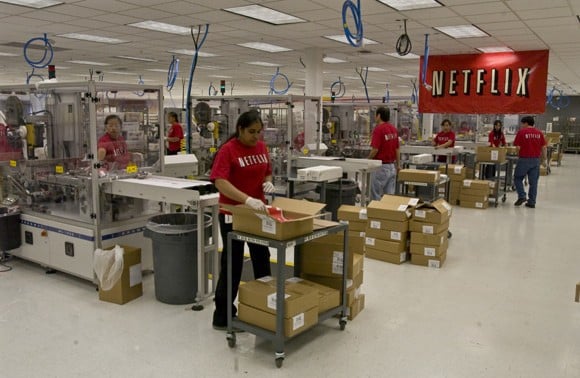Netflix Details Subscriber Loss, Expansion Plans For 2012
Netflix posted its Q3 results today, and they reflect what analysts generally expected. The company's price hikes, combined with its schizophrenic announcement that it would split the brand (followed by a retraction a few weeks later) took a toll on the total number of subscribers. The total number of subscribers fell from 24.59M in Q2 to 23.79M in Q3. That's a net loss of 800,000 people, but the actual number of departures was likely much higher, given that the company undoubtedly added subscribers throughout the quarter.
The company's letter to shareholders shed light on how the events were internally perceived.

One of the most interesting parts of Netflix's letter is the company's discussion of whether or not a 'hybrid' viewing option (streaming + DVD) is attractive. It notes that only 7 percent of new members are choosing both DVDs and streaming at $15.98. "One could argue that this percentage would increase if we reduced the price for hybrid, but if we were going to lower prices, we would do it on streaming. Our future is in rapidly expanding streaming, but we will make sure that current hybrid subscribers continue to get a great and stable experience. As of today, less than half of our streaming subscribers also subscribe to our DVD service, and we expect that number to continue to fall."
While interesting, Netflix's response is a better indicator of whether or not people are willing to pay for both services when the combined cost is $15.98, not an absolute indicator of whether or not people are interested in continuing to rent DVDs by mail. Knowing how many Netflix users used to rent DVDs by mail but have given up doing so would be a better marker of the long-term viability of such service.
The company's letter to shareholders shed light on how the events were internally perceived.
We think that $7.99 for unlimited streaming and $7.99 for unlimited DVD are both very aggressive low prices, relative to competition and to the value of the services, and they are the right place for Netflix to be in the long term. What we misjudged was how quickly to move there. We compounded the problem with our lack of explanation about the rising cost of the expansion of streaming content, and steady DVD costs, so that... many perceived us as greedy.Netflix expects to end 2012 in the red, but not because of a further loss in subscribers. The company will launch in the UK and Ireland in 2012, and while it believes that will drive new business in the long term, the short-term impact of opening new offices and creating international supply chains is expected to eat into profits.
Our primary issue is that many of our long-term members felt shocked by the pricing changes and more of them have expressed that by cancelling Netflix than we expected. Because of this, our revenue and profits in Q4 will be lower than we had anticipated, but we'll remain profitable on a global basis.

One of the most interesting parts of Netflix's letter is the company's discussion of whether or not a 'hybrid' viewing option (streaming + DVD) is attractive. It notes that only 7 percent of new members are choosing both DVDs and streaming at $15.98. "One could argue that this percentage would increase if we reduced the price for hybrid, but if we were going to lower prices, we would do it on streaming. Our future is in rapidly expanding streaming, but we will make sure that current hybrid subscribers continue to get a great and stable experience. As of today, less than half of our streaming subscribers also subscribe to our DVD service, and we expect that number to continue to fall."
While interesting, Netflix's response is a better indicator of whether or not people are willing to pay for both services when the combined cost is $15.98, not an absolute indicator of whether or not people are interested in continuing to rent DVDs by mail. Knowing how many Netflix users used to rent DVDs by mail but have given up doing so would be a better marker of the long-term viability of such service.

